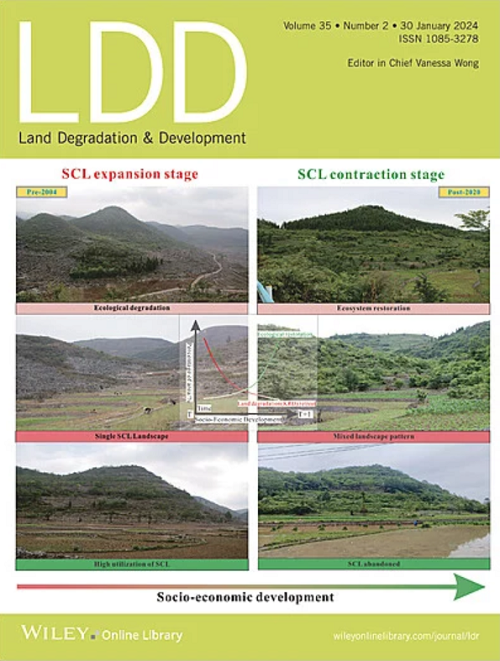气候政策不确定性对农业发展的影响:基于土地利用、粮食结构和碳排放的多维分析
IF 3.6
2区 农林科学
Q2 ENVIRONMENTAL SCIENCES
引用次数: 0
摘要
全球气候变化给农业可持续性带来了前所未有的挑战,但在气候政策不确定性(CPU)对农业系统的多维影响方面,仍存在巨大的知识缺口。以往的研究主要集中在土地利用变化、生产决策或排放模式等孤立方面,而忽视了相互关联的农业维度之间的综合效应。这种碎片化突出表明,需要建立全面的分析框架,捕捉政策不确定性与农业发展轨迹之间复杂的相互作用。本文利用双向固定效应和空间误差模型(SEM)对2011-2022年中国各省的面板数据进行了研究。实证结果表明,CPU在三个关键维度上显著阻碍农业发展:降低土地利用效率、破坏最优粮食结构和影响碳排放特征。区域异质性分析表明,西部地区对土地利用和粮食结构的政策不确定性影响表现出更高的脆弱性,而中部地区对农业碳排放表现出明显的敏感性。此外,空间计量模型还发现了显著的负溢出效应,即一个地区的政策不确定性降低了邻近地区的土地利用效率和粮食结构优化,同时通过资源配置机制影响区域间的排放格局。这些发现有助于从理论上理解政策-农业相互作用,并为制定差异化的气候政策方法提供经验基础,以平衡粮食安全要求与环境可持续性目标。本文章由计算机程序翻译,如有差异,请以英文原文为准。
Impact of Climate Policy Uncertainty on Agriculture Development: Multidimensional Analysis From Land Use, Food Structure, and Carbon Emissions
Global climate change poses unprecedented challenges for agricultural sustainability, yet significant knowledge gaps persist regarding the multidimensional impacts of climate policy uncertainty (CPU) on agricultural systems. Previous research has primarily focused on isolated aspects such as land-use changes, production decisions, or emission patterns, neglecting the integrated effects across interconnected agricultural dimensions. This fragmentation underscores the need for comprehensive analytical frameworks that capture complex interactions between policy uncertainty and agricultural development trajectories. This study investigates these relationships through two-way fixed effects and spatial error model (SEM) applied to panel data from Chinese provinces spanning 2011–2022. Empirical findings reveal that CPU significantly impedes agricultural development across three critical dimensions: reducing land utilization efficiency, disrupting optimal food structures, and affecting carbon emission profiles. Regional heterogeneity analyses demonstrate that western regions exhibit heightened vulnerability to policy uncertainty effects on land use and food structures, while central regions show pronounced sensitivity regarding agricultural carbon emissions. Furthermore, spatial econometric modeling identifies significant negative spillover effects, whereby policy uncertainty in one region diminishes land utilization efficiency and food structure optimization in neighboring areas, while simultaneously influencing interregional emission patterns through resource allocation mechanisms. These findings contribute to the theoretical understanding of policy–agriculture interactions and provide empirical foundations for developing differentiated climate policy approaches that balance food security imperatives with environmental sustainability objectives.
求助全文
通过发布文献求助,成功后即可免费获取论文全文。
去求助
来源期刊

Land Degradation & Development
农林科学-环境科学
CiteScore
7.70
自引率
8.50%
发文量
379
审稿时长
5.5 months
期刊介绍:
Land Degradation & Development is an international journal which seeks to promote rational study of the recognition, monitoring, control and rehabilitation of degradation in terrestrial environments. The journal focuses on:
- what land degradation is;
- what causes land degradation;
- the impacts of land degradation
- the scale of land degradation;
- the history, current status or future trends of land degradation;
- avoidance, mitigation and control of land degradation;
- remedial actions to rehabilitate or restore degraded land;
- sustainable land management.
 求助内容:
求助内容: 应助结果提醒方式:
应助结果提醒方式:


